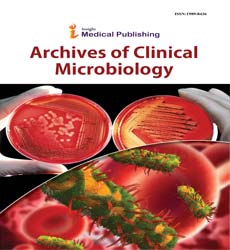Abstract
A Simplified method of Three Dimensional Technique For The Detection Of AmpC Beta-Lactamases
Background: AmpC beta-lactamases are cephalosporinases that confer resistance to a wide variety of beta-lactam antibiotics. Detecting AmpC-mediated  resistance in gram negative organisms is a challenge for laboratories due to misleading results in phenotypic tests. There is always a search for newer and reliable methods which will be more user-friendly to detect these enzymes in routine diagnostic laboratories. Objective: To design a  simplified three-dimensional test for detecting the occurrence of AmpC β-lactamases. Material and Methods: A total of 201 consecutive, non-duplicate, gram-negative clinical isolates of E.coli (n=65), Klebsiella spp.(n=70), Proteus spp.(n=4), citrobacter spp. (n=9), Enterobacter spp.( n=8), P.aeruginosa (n=27) and Acinetobacter spp.(n=18), obtained over a period of six months (June to December, 2011) from patients with nosocomial infections were screened for AmpC producers by Kirby Bauer disk diffusion method using cefoxitin (30μg). Isolates with zone diameter less than 18 mm were tested for inducible AmpC beta-lactamases by disk antagonism test, and plasmid mediated AmpC activity by indigenously developed simplified three dimensional and AmpC disk tests. Results: Amongst the 201 gram-negative clinical isolates tested, the simplified three dimensional test identified 60(29.8%) and AmpC disk test  yielded 51(25.3%) as plasmid AmpC producers from 69 screening positive isolates. Production of inducible AmpC beta-lactamase was shown in 3(1.5%) isolates by disk antagonism test. Co-productions of extended spectrum beta-lactamases and metallo-beta-lactamases with AmpC beta-lactamases were observed in 3.9% and 4.9% isolates respectively. Conclusion: This simplified three dimensional technique is simple, reproducible, convenient, reliable and accurate means of detection of AmpC beta-lactamases. It can serve as a potentially useful diagnostic tool in those health care settings where polymerase chain reaction and inhibitor based methods for the detection of AmpC enzymes are costly and not readily available.
Author(s): R.K. Manojkumar Singh, Nishith Kumar Pal, Mandira Banerjee, Soma Sarkar, Puranjoy Saha, Manideepa SenGupta
Abstract | PDF
Share this

Abstracted/Indexed in
- Google Scholar
- Open J Gate
- Genamics JournalSeek
- The Global Impact Factor (GIF)
- Open Archive Initiative
- China National Knowledge Infrastructure (CNKI)
- Scimago
- Directory of Research Journal Indexing (DRJI)
- WorldCat
- Proquest Summons
- Publons
- MIAR
- ResearchGate
- University Grants Commission
- Geneva Foundation for Medical Education and Research
- Secret Search Engine Labs
Open Access Journals
- Aquaculture & Veterinary Science
- Chemistry & Chemical Sciences
- Clinical Sciences
- Engineering
- General Science
- Genetics & Molecular Biology
- Health Care & Nursing
- Immunology & Microbiology
- Materials Science
- Mathematics & Physics
- Medical Sciences
- Neurology & Psychiatry
- Oncology & Cancer Science
- Pharmaceutical Sciences

